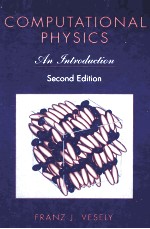
- 作 者:
- 出 版 社:KLUWER ACADEMIC/PLENUM PUBLISHERS NEW YORK
- 出版年份:2001
- ISBN:0306466317
- 标注页数:259 页
- PDF页数:274 页
请阅读订购服务说明与试读!
订购服务说明
1、本站所有的书默认都是PDF格式,该格式图书只能阅读和打印,不能再次编辑。
2、除分上下册或者多册的情况下,一般PDF页数一定要大于标注页数才建议下单购买。【本资源274 ≥259页】
图书下载及付费说明
1、所有的电子图书为PDF格式,支持电脑、手机、平板等各类电子设备阅读;可以任意拷贝文件到不同的阅读设备里进行阅读。
2、电子图书在提交订单后一般半小时内处理完成,最晚48小时内处理完成。(非工作日购买会延迟)
3、所有的电子图书都是原书直接扫描方式制作而成。
Ⅰ The Three Pillars of Computational Physics 1
1 Finite Differences 7
1.1 Interpolation Formulae 9
1.1.1 NGF Interpolation 9
1.1.2 NGB Interpolation 10
1.1.3 ST Interpolation 11
1.2 Difference Quotients 12
1.2.1 DNGF Formulae 12
1.2.2 DNGB Formulae 14
1.2.3 DST Formulae 15
1.3 Finite Differences in Two Dimensions 17
1.4 Sample Applications 18
1.4.1 Classical Point Mechanics 18
1.4.2 Diffusion and Thermal Conduction 19
2 Linear Algebra 21
2.1 Exact Methods 22
2.1.1 Gauss Elimination and Back Substitution 22
2.1.2 Simplifying Matrices: The Householder Transformation 25
2.1.3 LU Decomposition 26
2.1.4 Tridiagonal Matrices: Recursion Method 29
2.2 Iterative Methods 31
2.2.1 Jacobi Relaxation 32
2.2.2 Gauss-Seidel Relaxation (GSR) 34
2.2.3 Successive Over-Relaxation (SOR) 34
2.2.4 Alternating Direction Implicit Method (ADI) 36
2.2.5 Conjugate Gradient Method (CG) 36
2.3 Eigenvalues and Eigenvectors 40
2.3.1 Largest Eigenvalue and Related Eigenvector 40
2.3.2 Arbitrary Eigenvalue/-vector: Inverse Iteration 42
2.4 Sample Applications 43
2.4.1 Diffusion and Thermal Conduction 43
2.4.2 Potential Equation 44
2.4.3 Electronic Orbitals 45
3 Stochastics 47
3.1 Equidistributed Random Variates 49
3.1.1 Linear Congruential Generators 49
3.1.2 Shift Register Generators 50
3.2 Other Distributions 53
3.2.1 Fundamentals 53
3.2.2 Transformation Method 56
3.2.3 Generalized Transformation Method: 57
3.2.4 Rejection Method 59
3.2.5 Multivariate Gaussian Distribution 62
3.2.6 Equidistribution in Orientation Space 66
3.3 Random Sequences 68
3.3.1 Fundamentals 68
3.3.2 Markov Processes 71
3.3.3 Autoregressive Processes 74
3.3.4 Wiener-Levy Process 77
3.3.5 Markov Chains and the Monte Carlo method 78
3.4 Stochastic Optimization 80
3.4.1 Simulated Annealing 81
3.4.2 Genetic Algorithms 82
Ⅱ Everything Flows 85
4 Ordinary Differential Equations 89
4.1 Initial Value Problems of First Order 90
4.1.1 Euler-Cauchy Algorithm 90
4.1.2 Stability and Accuracy of Difference Schemes 91
4.1.3 Explicit Methods 94
4.1.4 Implicit Methods 96
4.1.5 Predictor-Corrector Method 98
4.1.6 Runge-Kutta Method 101
4.1.7 Extrapolation Method 104
4.2 Initial Value Problems of Second Order 105
4.2.1 Verlet Method 105
4.2.2 Predictor-Corrector Method 108
4.2.3 Nordsieck Formulation of the PC Method 110
4.2.4 Runge-Kutta Method 112
4.2.5 Symplectic Algorithms 112
4.2.6 Numerov’s Method 117
4.3 Boundary Value Problems 119
4.3.1 Shooting Method 120
4.3.2 Relaxation Method 121
5 Partial Differential Equations 125
5.1 Initial Value Problems I (Hyperbolic) 129
5.1.1 FTCS Scheme; Stability Analysis 129
5.1.2 Lax Scheme 131
5.1.3 Leapfrog Scheme (LF) 133
5.1.4 Lax-Wendroff Scheme (LW) 135
5.1.5 Lax and Lax-Wendroff in Two Dimensions 135
5.2 Initial Value Problems 11 (Parabolic) 138
5.2.1 FTCS Scheme 138
5.2.2 Implicit Scheme of First Order 140
5.2.3 Crank-Nicholson Scheme (CN) 141
5.2.4 Dufort-Frankel Scheme (DF) 143
5.3 Boundary Value Problems: Elliptic DE 143
5.3.1 Relaxation and Multigrid Techniques 147
5.3.2 ADI Method for the Potential Equation 148
5.3.3 Fourier Transform Method (FT) 150
5.3.4 Cyclic Reduction (CR) 153
Ⅲ Anchors Aweigh 157
6 Simulation and Statistical Mechanics 161
6.1 Model Systems of Statistical Mechanics 164
6.1.1 A Nutshellfull of Fluids and Solids 164
6.1.2 Tricks of the Trade 168
6.2 Monte Carlo Method 171
6.3 Molecular Dynamics Simulation 175
6.3.1 Hard Spheres 175
6.3.2 Continuous Potentials 177
6.3.3 Beyond Basic Molecular Dynamics 178
6.4 Evaluation of Simulation Experiments 181
6.4.1 Pair Correlation Function 182
6.4.2 Autocorrelation Functions 184
6.5 Particles and Fields 185
6.5.1 Ewald summation 186
6.5.2 Particle-Mesh Methods (PM and P3M): 188
6.6 Stochastic Dynamics 191
7 Quantum Mechanical Simulation 195
7.1 Diffusion Monte Carlo (DMC) 196
7.2 Path Integral Monte Carlo (PIMC) 201
7.3 Wave Packet Dynamics (WPD) 209
7.4 Density Functional Molecular Dynamics(DFMD) 211
8 Hydrodynamics 215
8.1 Compressible Flow without Viscosity 216
8.1.1 Explicit Eulerian Methods 217
8.1.2 Particle-in-Cell Method (PIC) 218
8.1.3 Smoothed Particle Hydrodynamics (SPH) 220
8.2 Incompressible Flow with Viscosity 226
8.2.1 Vorticity Method 227
8.2.2 Pressure Method 229
8.2.3 Free Surfaces: Marker-and-Cell Method (MAC) 231
8.3 Lattice Gas Models for Hydrodynamics 232
8.3.1 Lattice Gas Cellular Automata 232
8.3.2 The Lattice Boltzmann Method 236
8.4 Direct Simulation Monte Carlo / Bird method 237
Appendixes 239
A Machine Errors 241
B Discrete Fourier Transformation 245
B.1 Fundamentals 245
B.2 Fast Fourier Transform (FFT) 246
Bibliography 249
Index 257
